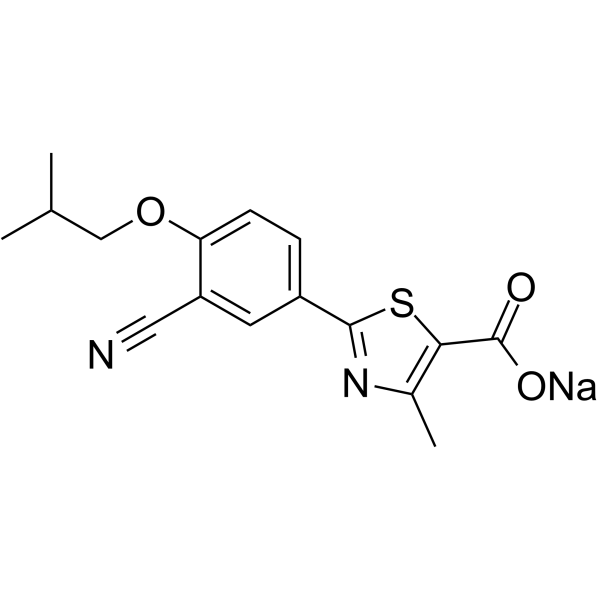Febuxostat sodium
Modify Date: 2024-01-12 13:25:05

Febuxostat sodium structure
|
Common Name | Febuxostat sodium | ||
|---|---|---|---|---|
| CAS Number | 1140907-13-6 | Molecular Weight | 338.36 | |
| Density | N/A | Boiling Point | N/A | |
| Molecular Formula | C16H15N2NaO3S | Melting Point | N/A | |
| MSDS | N/A | Flash Point | N/A | |
Use of Febuxostat sodiumFebuxostat (TEI 6720) sodium is a potent, selective and non-purine xanthine oxidase (XO) inhibitor with a Ki value of 0.6 nM. Febuxostat sodium has the potential for the research of hyperuricemia and gout[1][2][3]. |
| Name | Febuxostat sodium |
|---|
| Description | Febuxostat (TEI 6720) sodium is a potent, selective and non-purine xanthine oxidase (XO) inhibitor with a Ki value of 0.6 nM. Febuxostat sodium has the potential for the research of hyperuricemia and gout[1][2][3]. |
|---|---|
| Related Catalog | |
| In Vitro | Febuxostat sodium displays potent mixed-type inhibition of the activity of purified bovine milk xanthine oxidase, with Ki and Ki' values of 0.6 nM and 3.1 nM respectively, indicating inhibition of both the oxidized and reduced forms of xanthine oxidase[1]. |
| In Vivo | Febuxostat sodium (5-6 mg/kg; i.e.; daily for 4 weeks) (fed a high-fructose diet (60% fructose) for 8 wk) significantly reduces lomerular pressure, renal vasoconstriction, and afferent arteriolar area relative to fructose+P rats, and shows no significant effects in rats on a normal diet when febuxostat treatment alone[2]. Febuxostat sodium (3-4 mg/kg; p.o.; daily for 4 weeks) with oxonic acid (750 mg/kg; oral gavage; daily for 4 weeks) preventes renal injury in 5/6 Nx (5/6 nephrectomy) rats with and without coexisting hyperuricemia[3]. Febuxostat sodium (2.5 mg/kg; p.o.; daily for 12 weeks) inhibits plaque formation in ApoE−/− mice and reduces the levels of ROS in the aortic wall of atherosclerotic mice[4]. Febuxostat sodium (15.6 mg/kg; p.o.; once daily for 21 successive days) shows antidepressant effect by significantly reduces the immobility time in the FST in mouse[5]. Febuxostat sodium (10 mg/kg; p.o.; daily for 21 days) administration with doxorubicin caused a significant decrease in nephrotoxicity markers and inflammatory mediators, restoration of normal values of oxidative stress biomarkers and hampering the expression of renal caspase-3[6]. |
| References |
| Molecular Formula | C16H15N2NaO3S |
|---|---|
| Molecular Weight | 338.36 |